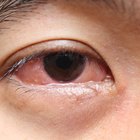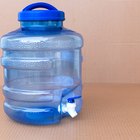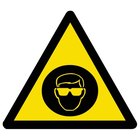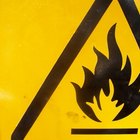
djedzura/iStock/Getty Images
Household bleach contains a compound called sodium hypochorite, usually diluted to 5.25 percent with water. it's also a component of several household cleaning products, including laundry soap and mildew remover. It's a corrosive chemical that burns skin and eyes on contact. Bleach also reacts with some other household chemicals, such as ammonia, to produce toxic gases.
Avoid Accidents
Store bleach in the original container so that the manufacturer's safety instructions are readily available. Keep bleach and other cleaning products away from children, in a high or locked cupboard. Educate yourself on the contents of household cleaning products by reading the labels. The most common cause of bleach in eyes and lungs is gas created by accidentally mixing a product containing bleach with another containing ammonia.
Bleach in Eyes
Bleach can affect your eyes in either liquid or gas form. Symptoms include a burning sensation and blurred vision. Get away from the source of the bleach and wash your eyes with clean, running water for at least 15 minutes. This is easier if someone can help you. Ensure that the water runs away from uncontaminated skin and clothing. If you wear contact lenses, remove them immediately and throw them away.
Bleach in Lungs
Inhaling the gases given off by bleach mixtures can affect your lungs. Symptoms may include coughing, shortness of breath and a burning sensation in your throat. Get to fresh air immediately, find some support to sit up, keep calm and call for medical assistance. Oxygen can help with breathing difficulties and cooling your airway. Doctors will observe your condition for at least two hours to check for fluid in your lungs.
General First Aid
A bleach spillage may affect your clothing and other areas of skin. Remove contaminated clothing before the liquid spreads to other parts of your body. Wash everywhere apart from your eyes with soap and cool water. If you have swallowed bleach don't try to vomit; the corrosive effects will be magnified by your stomach acid. Drink small amounts of water or milk, if you can do so without nausea, and seek medical help.
Long-term Effects
If you act swiftly to neutralize the effects of household bleach on either the eyes or lungs, long-term damage is unlikely. Higher concentrations of sodium hypochlorite from industrial products, or exposure that is left untreated, can lead to extensive tissue damage. Always call 911 immediately if you suspect contamination with a corrosive chemical.
Related Articles

Skin Problems Caused by Swimming Pool ...

How to Bleach a Shirt by Hand

How to Wash Nomex

How to Whiten Jeans

The Side Effects of Sodium Bisulfite

How to Get the Gray Stains Out of ...

How to Clean Dentures With Bleach

How to Bleach Hair Permanently

How to Strip Black Dye Out of Hair

How to Purify Water With Hydrogen ...

How to Sterilize Safety Goggles

Why Do White Clothes Turn Yellow in ...

Why Is Milk So Fattening?

How to Remove Body Odor Smell From a ...

Safety Hazards of Acetone

What Are the Dangers of Tantalum?

How to Get Shampoo Out of the Eyes

How to Sterilize Eyeglasses

How to Make Homemade Silver Jewelry ...

How to Make Hair Stripper
References
Resources
Writer Bio
Carolyn Steele began writing about healthcare in 1995. She has designed training courses in first aid and emergency planning, and her work has appeared in various online publications. She later became a travel writer, and has been published by the Rough Guides, "Emigrate Magazine" and British and London Mensa magazines.
Photo Credits
djedzura/iStock/Getty Images